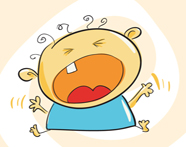Separation Anxiety

Is your baby only happy when you are within arm’s reach? When you leave the room, does your child cry as if you’ve left the country? Do you find it nearly impossible to go out for dinner, let alone take a shower! If this is the case with your baby, rest assured that nothing you’ve done has “made” your baby develop separation anxiety. It’s a perfectly normal and important developmental adaptation. Nearly all children experience separation anxiety between the ages of seven and 18 months. Some have more intense reactions than others, and for some, the stage lasts longer than others, but almost all babies have it to some degree.
The development of separation anxiety demonstrates that your baby has formed a healthy, loving attachment to you. It is a beautiful sign that your baby associates pleasure, comfort, and security with your presence. It also indicates that your baby is developing intellectually (in other words, she’s smart!). She has learned that she can have an effect on her world when she makes her needs known, and she doesn’t have to passively accept a situation that makes her uncomfortable. She doesn’t know enough about the world yet to understand that when you leave her you’ll always come back. She also realizes that she is safest, happiest, and best cared for by you, so her reluctance to part makes perfect sense – especially when viewed from a survival standpoint. Put another way: You are her source of nourishment, both physical and emotional; therefore, her attachment to you is her means of survival, and when she reaches a certain level of intellectual maturity, she realizes this.
This stage, like so many others in childhood, will pass. In time, your baby will learn that she can separate from you, that you will return, and that everything will be okay between those two points in time. Much of this learning is based on trust, which, just as for every human being young or old, takes time to build.
How do I know if my baby has separation anxiety?
Separation anxiety is pretty easy to spot, and you’re probably reading this section because you’ve identified it in your baby. The following are behaviors typically demonstrated by a baby with normal separation anxiety:
• Clinginess
• Crying when a parent is out of sight
• Strong preference for only one parent
• Fear of strangers
• Waking at night crying for a parent
• Easily comforted in a parent’s embrace
How you can help your baby with separation anxiety:
• Allow your baby to be a baby. It’s perfectly okay — even wonderful — for your baby to be so attached to you and for her to desire your constant companionship. Congratulations, Mommy or Daddy: It’s evidence that the bond you’ve worked so hard to create is holding. So politely ignore those who tell you otherwise.
• Don’t worry about spoiling her with your love, since quite the opposite will happen. The more that you meet her attachment needs during babyhood, the more
confident and secure she will grow up to be.
• Minimize separations when possible. It’s perfectly acceptable for now – better, in
fact – to avoid those situations that would have you separate from your baby. All too soon, your baby will move past this phase and on to the next developmental milestone.
• Give your baby lessons in object permanence. As your baby learns that things continue to exist even when she can’t see them, she’ll feel better about letting you out of her sight. Games like peek-a-boo and hide-and-seek will help her understand this phenomenon.
• Practice with quick, safe separations. Throughout the day, create situations of brief separation. When you go into another room, whistle, sing, or talk to your baby so she knows you’re still there, even though she can’t see you.
• Don’t sneak away when you have to leave her. It may seem easier than dealing with a tearful goodbye, but it will just cause her constant worry that you’re going to disappear without warning at any given moment. The result? Even more clinginess, and diminished trust in your relationship.
This article is an excerpt from Gentle Baby Care by Elizabeth Pantley. (McGraw-Hill, 2003)



